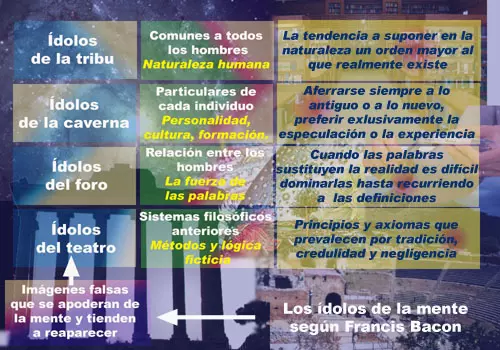 Bacon's fundamental project is: “to establish and extend humanity's dominance over the universe... which depends entirely on both the arts and the sciences. Because we cannot master nature but obey it” Novum Organum, Bacon
Bacon's fundamental project is: “to establish and extend humanity's dominance over the universe... which depends entirely on both the arts and the sciences. Because we cannot master nature but obey it” Novum Organum, Bacon
In his utopia The New Atlantis, Bacon aspires to a reform of society through applied science, for which it will be necessary, first of all, to initiate a review of scientific objectives and methods.
The particularity of Bacon's humanism is that it is a technical humanism because “the introduction of famous discoveries is by far the first place among human actions” and benefits more than any social or political reform. But it is only possible to master nature by knowing its structure and laws, technique is not possible without prior knowledge of reality through science. Otherwise, inventions are nothing but coincidence. Thus, scientific discoveries and their applications are more useful as they open the doors for new findings. Bacon refers to the importance of the scientific method of discovery, which develops in his work Novum Organum
The inductive method
It would be wrong to argue that Bacon created the inductive method, in effect, this method was used by early Greek philosophers, but Bacon sees in the induction of the ancients only a sort of “anticipation” of Nature. In addition, it was an inducement that came from “simple enumeration”, a deficiency that Bacon gets to point out and tries to correct. However, Bacon, failing to grasp the value of mathematics developed among the great scientists of his time, failed to perfect his complex method.
Bacon's merit is undoubtedly the struggle for the practical application of scientific knowledge, leading to the development of technology in terms of a better quality of life for humanity.
Bacon highlights that the paths to the truth are two:
It is therefore a precipitous and erroneous path because it goes from sensory impressions and to the more general axioms and, starting from these principles and from what is believed to be immutable truth in them, to the discussion and discovery of the medial acciomes. In this sense, Aristotelian logic “serves more to fix and consolidate errors based on vulgar notions than to inquire the truth” Novum Organum, Bacon
It means escaping from sensory axioms and from particular facts, in order to arrive at more general principles. This option is much slower and progressive and is valid for establishing the principles that govern Nature. Bacon refers to the inductivemethod
In short, the difference is not based on using or not using experience but on the fact that Aristotelian logic does not reach the real nature, but only “anticipates” it, because it produces a leap towards more general principles, so it only refers to the “past experience”. In addition, a superior experience is used, a few particular facts and if a fact is presented that does not respond to the axioms obtained precipitously, some frivolous exception is made instead of making a correction of the axiom contradicted by the particular case.
Bacon believes that there is something in our mind that leads us to choose error and the easiest way, so before starting the method of interpretation of nature, it is necessary to eliminate prejudices (idols of the mind).
